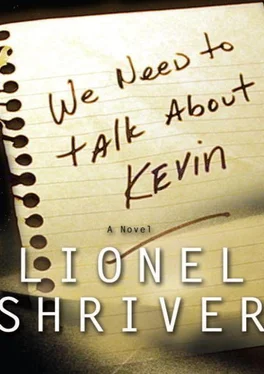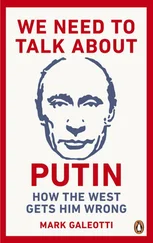For in one respect I was touched, and remain so: I think he had experienced a closeness to me that he was reluctant to let go. Not only were we in this cover-up together, but during the very assault we were concealing, Kevin too may have felt whole, yanked to life by the awesome sisal strength of the umbilical tie. For once I’d known myself for his mother. So he may have known himself also, sailing amazedly across the nursery like Peter Pan, for my son.
The remainder of that summer defied all my narrative instincts. Had I been scripting a TV movie about a violent harridan who flew into fits of blind dudgeon during which she was endowed with superhuman strength, I’d have had her young boy tiptoeing around the house, shooting her tremulous grins, offering up desperate gestures of appeasement, and just in general shuffling, cowering, and yes-massa-ing about the place, anything to keep from taking impromptu trips across whole rooms of their home without his feet ever touching the floor.
So much for the movies. I tiptoed. My grins quivered. I shuffled and cowered as if auditioning for a minstrel show.
Because let’s talk about power. In the domestic polity, myth dictates that parents are endowed with a disproportionate amount of it. I’m not so sure. Children? They can break our hearts, for a start. They can shame us, they can bankrupt us, and I can personally attest that they can make us wish we were never born. What can we do? Keep them from going to the movies. But how? With what do we back up our prohibitions if the kid heads belligerently for the door? The crude truth is that parents are like governments: We maintain our authority through the threat, overt or implicit, of physical force. A kid does what we say—not to put too fine a point on it—because we can break his arm.
Yet Kevin’s white cast became a blazing emblem, not of what I could do to him, but of what I could not. In resorting to the ultimate power, I had robbed myself of it. Since I could not be trusted to use force in moderation, I was stuck with an impotent arsenal, useless overkill, like a stockpile of nuclear weapons. He knew full well that I would never lay a hand on him again.
So in case you worry that in 1989 I became a convert to Neanderthal brutality, all that wholeness and realness and immediacy that I discovered in using Kevin for a shot put evaporated in a New York minute. I remember feeling physically shorter. My posture deteriorated. My voice went wispy. To Kevin, I couched my every request as an optional suggestion: Honey, would you like to get in the car? You wouldn’t mind terribly if we went to the store? Maybe it would be a good idea if you didn’t pick the crust from the middle of Mommer’s freshly baked pie. As for the lessons he found such an insult, I returned to the Montessori method.
At first, he put me through a variety of paces, as if training a performing bear. He would demand something time-consuming for his lunch, like homemade pizza, and after I’d spent the morning kneading dough and simmering sauce he’d pick two pieces of pepperoni off his slices and then fold the remains into a glutinous baseball to pitch to the sink. Then he tired of Mother-as-plaything as quickly as he did of his other toys, which I guess made me lucky.
In fact, as I foisted on the boy the very salt-laden cheesies and whizzies previously meted out in one-ounce rations, my solicitation soon got on his nerves. I had a tendency to hover, and Kevin would shoot me the kind of daggers you fire at a stranger who sits next to you on a train when the car is practically empty. I was proving an unworthy adversary, and any further victories over a guardian already reduced to such a cringing, submissive condition were bound to feel cheap.
Although it was tricky with a sling, he now took baths on his own, and if I stooped to wrap him in a fresh towel, he shied, then swaddled himself. In fact, on the heels of having docilely submitted to diaper changing and testicle swabbing, he developed a stern modesty, and by August, I was banished from the bathroom. He dressed in private. Aside from that remarkable two weeks during which he got so sick when he was ten, he would not allow me to see him naked again until the age of fourteen—at which point I’d gladly have forfeited the privilege.
As for my incontinent outpouring of tenderness, it was tainted with apology, and Kevin was having none of it. When I kissed his forehead, he wiped it off. When I combed his hair, he batted me away and rumpled his locks. When I hugged him, he objected coldly that I was hurting his arm. And when I averred, “I love you, kiddo”—no longer recited with the solemnity of the Apostle’s Creed but rather with the feverish, mindless supplication of a Hail Mary—he’d assume a caustic expression from which that permanent left-hand cock of his mouth was enduringly to emerge. One day when I avowed yet again I love you, kiddo , Kevin shot back, Nyeh NYEE nyeh, nyeh-nyeeeeh! and I gave it a rest.
He clearly believed that he had found me out. He had glimpsed behind the curtain, and no amount of cooing and snack food would erase a vision at least as indelible as a first encounter with parental sex. Yet what surprised me was how much this revelation of his mother’s true colors—her viciousness, her violence—seemed to please him. If he had my number, it was one that intrigued him far more than the twos and threes of our dreary arithmetic drills before his “accident,” and he side-eyed his mother with a brand new—I wouldn’t call it quite respect— interest . Yes.
As for you and me, until that summer I’d become accustomed to concealing things from you, but mostly thought crimes—my atrocious blankness at Kevin’s birth, my aversion to our house. While to some extent we all shelter one another from the cacophony of horrors in our heads, even these intangible unsaids made me mournful. But it was one thing to keep my own counsel about the dread that had descended on me whenever it was time to fetch our son from kindergarten, quite another to neglect to tell you that, oh, by the way, I broke his arm. However wicked, thoughts didn’t seem to take up space in my body, while keeping a three-dimensional secret was like having swallowed a cannonball.
You seemed so far away. I’d gaze at you as you undressed at night with a spectral nostalgia, half expecting that when I crossed to brush my teeth you’d step through my body as easily as through moonlight. Watching you in the backyard teaching Kevin to cup a baseball in a catcher’s mitt with his good right hand—though in truth he seemed more gifted with pizza—I’d press my palm against a sun-warmed windowpane as if against a spiritual barrier, stabbed by the same vertiginous well-wishing and aching sense of exclusion that would have tortured me had I been dead. Even when I put my hand on your chest, I couldn’t seem to quite touch you, as if every time you shed your clothes there were, like Bartholomew’s hats, another L. L. Bean work shirt underneath.
Meantime, you and I never went out just the two of us anymore—to catch Crimes and Misdemeanors, grab a bite at the River Club in Nyack, much less to indulge ourselves at the Union Square Café in the city. It’s true that we had trouble with sitters, but you acquiesced to our housebound nights readily enough, prizing the light summer evenings for coaching Kevin on fourth downs, three-pointer field goals, and the infield-fly rule. Your blindness to the fact that Kevin displayed neither interest nor aptitude in any of these sports nagged me a bit, but I was mostly disappointed that you didn’t ever covet the same quality time with your wife.
There’s no purpose to talking around it. I was jealous. And I was lonely.
It was toward the end of August when our next-door neighbor leaned on our doorbell with censorious insistence. I heard you answer it from the kitchen.
Читать дальше












